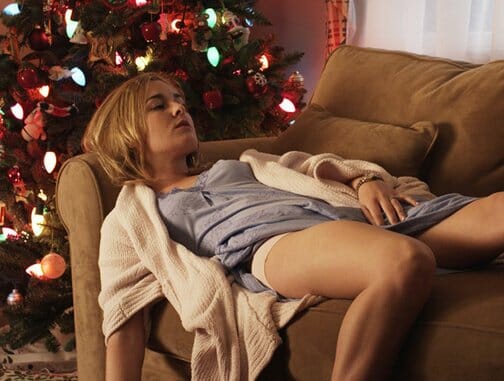White Reindeer

With White Reindeer, director-writer-editor Zach Clark has devised an atypical entry into the Christmas-movie genre, one characterized by both a genuine affection for the spirit of the holiday and a thorny character-study plot that, as is to be expected with Clark, contains its share of edgy material. Following an initially context-free opening image of serene clouds, palm trees, and a vast body of water, Clark assertively dresses his film in Christmas iconography: trees, scarves, stockings, ornaments, candy canes, holiday-themed jewelry, adorable e-cards. The clash between these traditionally uplifting signifiers and the narrative’s tough, confrontational detours provides the movie with its central tension. Clark’s idiosyncratic tone skillfully resists resting on one side in this tricky balancing act, although it’s a testament to his careful modulation that White Reindeer somehow arrives at a catharsis that feels of a piece with the lore of Hollywood melodrama. (Clark has cited Douglas Sirk’s All That Heaven Allows, from 1955, as a prime influence here.)
White Reindeer begins in late November: the temperatures are dropping, and Christmas sweaters bedeck the inhabitants of the film’s suburban-Virginia setting. Real-estate agent Suzanne Barrington (an exquisite Anna Margaret Hollyman) has just sold a house (in very close proximity to her own, it turns out) to a charming matching-wardrobe couple (played by Joe Swanberg and Lydia Hyslop, one of the stars of Clark’s previous Vacation!). Suzanne is married to Jeff (Nathan Williams), the popular local meteorologist; after what seems like a typical night of kitchen lovemaking (complete with Jeff’s play-by-play commentary) and dinner conversation, Jeff announces to Suzanne that he’s been offered a new job in Hawaii. With the new position set to begin in January, Jeff and Suzanne vow to make the most of their “last Christmas in Virginia.”
However, unexpected tragedy dawns on Suzanne when she arrives home one evening to find Jeff dead from a horrific gunshot wound to the head. The subsequent scenes—a funeral plagued by a poor microphone, a gathering at the house, a dream of a beach—play out in a sustained fog, Suzanne’s consciousness still reeling from the shock of the incident. She is revived, at least a little bit, when a friend (Mark Boyett) awkwardly confesses to her a transgression in Jeff’s past. This sends her on something of a scavenger hunt that, naturally, begins on the computer; while browsing through the Internet history on Jeff’s account, she comes across a link to a pornography website. In one memorable comedic image—which encompasses despair, confusion, disorientation and embarrassment—Suzanne watches the pornography while eating a salad.
-

-

-

-

-

-

-

-

-

-

-

-

-

-

-

-

-

-

-

-

-

-

-

-

-

-

-

-

-

-

-

-

-

-

-

-

-

-

-

-








































